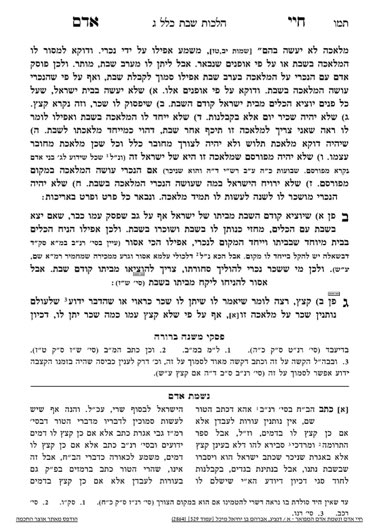We are continuing in siman 1, discussing the eight conditions which must be met to allow for a non-Jew to perform melacha for a Jew on Shabbos. So far,we learned the first six:
- The work cannot be done in the home of any Jew, and any materials must be removed from the home of the Jew before Shabbos.
- The non-Jew must be paid
- The non-Jew must be a kablan.
- The Jew cannot directly request that the work be done on Shabbos. He may not even indirectly imply that the melacha be done on Shabbos by putting the non-Jew in a situation in which it is inevitable that they will have to work on Shabbos.
- The non-Jew cannot perform melacha on anything attached to the ground.
- It cannot be well-known that the non-Jew is performing melacha for the Jew. The Chayei Adam defines “well-known” as three Jews.
- The Jew cannot have benefited from the fact the melacha was performed on Shabbos itself rather than after Shabbos. For example, the Chayei Adam will later discuss an example of a person who owns a merchatz (bathhouse). The Jew wants to hire non-Jews to work in the merchatz over Shabbos to serve non-Jewish bathers. All melacha will be performed by the non-Jews, but the Jew owns the property. Even if we avoid any other issues of amira l’achum, the Jew still receives the benefit of his merchatz being open on Shabbos , so it is a problem. Rather, it must be something from which there is no benefit to the Jew for the melacha being performed on Shabbos.
- If one has an ongoing arrangement with a non-Jew to perform melacha for him, if the non-Jew does work on Shabbos, it frees him up to perform other work during the week. Even if the non-Jew is hired per job (i.e., they are a kablan; see criteria 3), one may still have this issue. For example, a building owner contracts with a plumber for any plumbing issues, and pays them with a 1099 rather than a w-2, so there is no salaried/contracted arrangement. Although it would seem that the plumber is hired per job, and therefore works as a kablan, since there are always issues coming up, when the plumber does work on Shabbos it frees him up to do other work which will come up during the week. If so, the Jewish building owner benefits from the non-Jew, so it is assur for the non-Jew to perform the melacha.
- Amira l’akum is the prohibition against instructing a non-Jew to perform melacha on Shabbos.
- It is always assur to instruct a non-Jew on Shabbos itself.
- If one instructs a non-Jew before Shabbos, there are times when it will be muttar, depending on eight conditions. They are:
- The work cannot be done in the home of any Jew, and any materials must be removed from the home of the Jew before Shabbos.
- The non-Jew must be paid
- The non-Jew must be a kablan
- The Jew cannot directly request that the work be done on shabbos. He may not even indirectly imply that the melacha be done on Shabbos by putting the non-Jew in a situation in which it is inevitable that they will have to work on Shabbos.
- The non-Jew cannot perform melacha on anything attached to the ground.
- It cannot be well-known that the non-Jew is performing melacha for the Jew. The Chayei Adam defines “well-known” as three Jews.
- The Jew cannot benefit from the fact that the melacha was performed on Shabbos.
- The Jew cannot benefit from the non-Jew working on Shabbos such that the non-Jew is now free to perform other work during the week.



